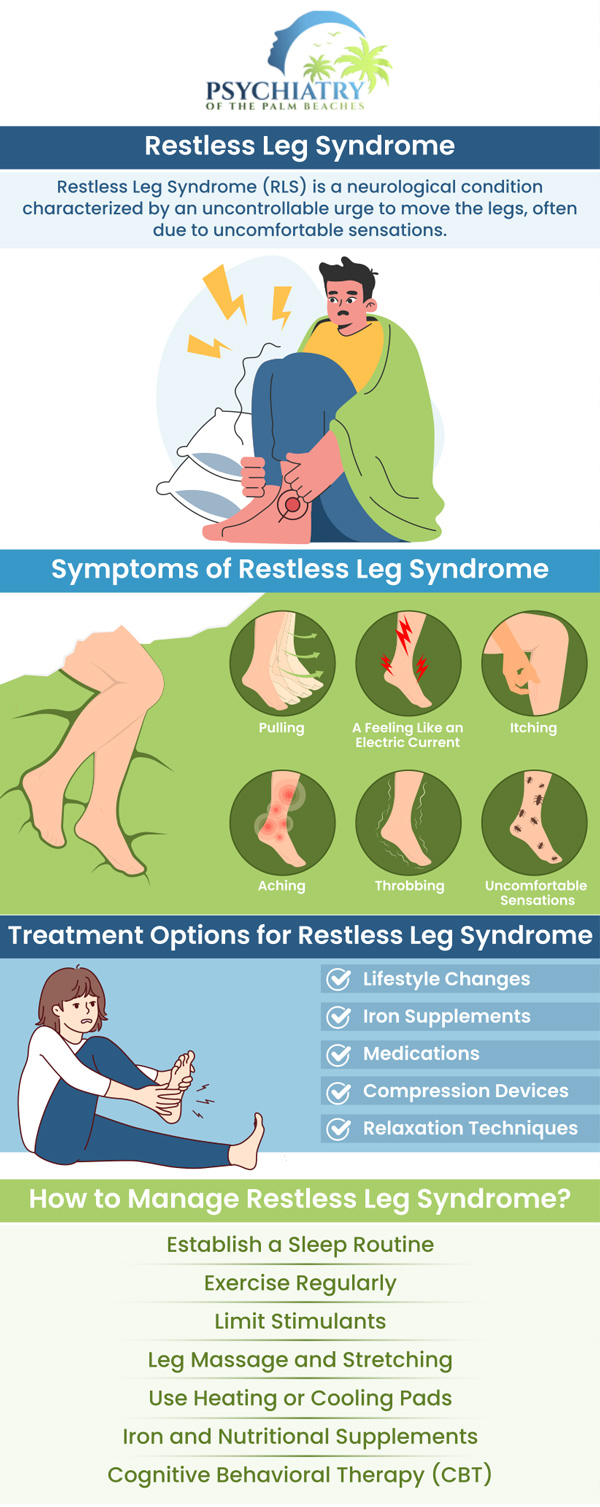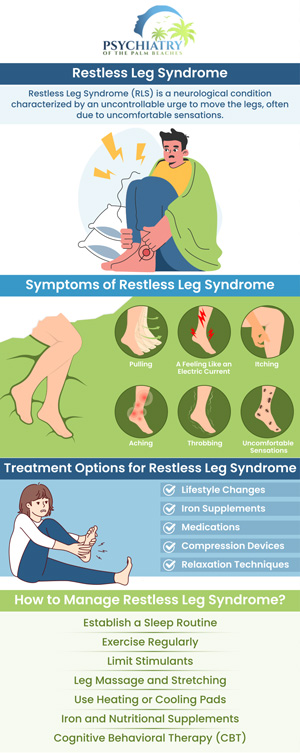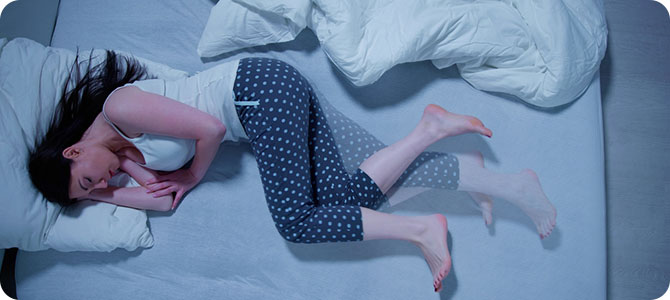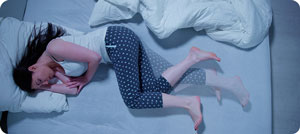Restless Leg Syndrome Treatment Clinic
Restless legs syndrome, also known as Willis-Ekbom illness, is a common nervous system ailment characterized by an intense, irresistible urge to move the legs. It can also induce a creeping or crawling sensation in the feet, calves, and thighs. The sensation is frequently exacerbated in the evening or at night. For more information, contact us or book an appointment online. We have convenient locations to serve you in Jacksonville, Boynton Beach, Palm Beach Gardens, Stuart, Royal Palm Beach, Port St. Lucie, Melbourne, Fort Lauderdale, and Jupiter, FL.




Table of Contents:
What is restless legs syndrome and what does it feel like?
What are the leading causes of restless leg syndrome?
When should I be worried about restless legs?
What are my treatment options for restless legs?
Restless Leg Syndrome, often abbreviated as RLS, is a condition that affects the nervous system and causes a very strong urge to move the legs. It’s a common condition that affects around 10% of the current population; however, left untreated, it can be very disruptive to sleep and daily life.
If you’re suffering from restless leg syndrome, connect with professionals at Psychiatry of the Palm Beaches or schedule an appointment online. Our team would be happy to help address this issue in a safe, professional, and effective manner.
Restless legs syndrome (RLS) is a neurological condition that causes an irresistible urge to move the legs, often causing discomfort and an overwhelming feeling that makes it difficult to sit still or sleep.
RLS can affect people of all ages and can occur at any time; however, it is more common among middle-aged and elderly people.
Those with RLS may feel sensations in their legs that are commonly described as pins and needles, creeping, crawling, or burning. These sensations are often accompanied by the urge to move the legs to relieve the discomfort and are often worse in the evening or at night when the person is lying down, trying to relax, or attempting to sleep.
Those with RLS may also experience involuntary leg movements that can disrupt their sleep and cause daytime fatigue.
While the exact cause of RLS is still unknown, several factors are believed to increase the risk of developing this condition. This includes:
• Genetics. Around half of the people who suffer from RLS have a family history of the condition, indicating that there may be a genetic component.
• Iron Deficiency. Iron is involved in the production of dopamine, a neurotransmitter that regulates movement, so when iron levels are low dopamine production may be reduced which can lead to RLS symptoms.
• Medications. Certain medications may trigger RLS or worsen existing symptoms, with the most common culprits being antidepressants, antihistamines, and anti-nausea drugs.
• Neurological Disorders. RLS is often associated with neurological disorders such as Parkinson’s disease, multiple sclerosis, and peripheral neuropathy.
• Pregnancy. Pregnant women are more likely to develop RLS, especially in the third trimester, which is thought to be related to hormonal changes and increased blood volume.
• Psychological Factors. Stress, anxiety, and depression have all been linked to RLS and can exacerbate existing symptoms.
If you’re experiencing frequent and severe restless legs symptoms that persist for weeks or months, you should take measures to seek medical advice. Restless legs syndrome can be indicative of an underlying medical condition such as iron deficiency, kidney disease, nerve damage, or peripheral arterial disease, and these underlying conditions can lead to serious health problems.
You should also seek medical attention if the symptoms of RLS are affecting your daily life, or if your restless legs are linked to other symptoms such as tingling, burning, or prickling sensations, pain, or muscle cramps.
Lastly, if you’re taking medication that is worsening or triggering restless leg syndrome, you should talk to your doctor about alternative treatment options.
There are several effective treatment options available for those suffering from RLS, including:
• Compression Stockings. Wearing compression stockings can help increase blood flow in the legs, reducing the symptoms of RLS.
• Iron Therapy. In some cases, low iron levels can contribute to RLS symptoms and supplementation may be effective in helping to alleviate the symptoms of this condition.
• Lifestyle Changes. Regular exercise, especially in the morning, can help to reduce symptoms of RLS. Avoiding caffeine and alcohol, smoking cessation, maintaining a healthy diet, and having good sleep habits is important too.
• Medical Devices. In severe cases, medical devices such as a transcutaneous electrical nerve stimulation device or an external counterpulsation device may be an effective treatment option.
• Medications. Dopamine agonists such as pramipexole and ropinirole are the first-line therapy for RLS because they mimic the neurotransmitter dopamine, which helps control movement. Other medications such as gabapentin and opioids may be used if the dopamine agonists don’t work.
• Reflexology and Massage Therapy. Therapeutic massages or reflexology may help to alleviate the symptoms of RLS by stimulating the muscles which helps increase circulation in the legs, relax the muscles, and reduce discomfort.
At Psychiatry of the Palm Beaches, we provide safe and effective treatment for RLS. If you’d like more information about our RLS services or would like to book an appointment, connect with us today – our team would be happy to assist you in getting started. We have convenient locations to serve you. We serve patients from Boynton Beach FL, Delray Beach FL, Palm Beach Gardens FL, Jupiter FL, Stuart FL, Palm City FL, Royal Palm Beach FL, Wellington FL, Citrus Ridge FL, Jacksonville FL, Riverside FL, Port St. Lucie FL, Beau Rivage West FL, Melbourne FL, Palm Bay FL, Fort Lauderdale FL, Hollywood FL, Jupiter FL, North Palm Beach FL, and surrounding areas.
Check Out Our 5 Star Reviews



Additional Services You May Need
▸ Mental Wellness
▸ Relationship Coaching
▸ Depression and Mood Disorders
▸ Women’s Health
▸ Panic Disorder
▸ Medications Management
▸ Men’s Health
▸ Individual Psychotherapy
▸ Bipolar
▸ ADHD
▸ Geriatric Mental Health
▸ Couple’s Counseling
▸ Obsessive Compulsive Disorder
▸ Social Phobia Treatment
▸ Eating Disorders
▸ Post Traumatic Stress Disorder
▸ Psychotic Disorders


